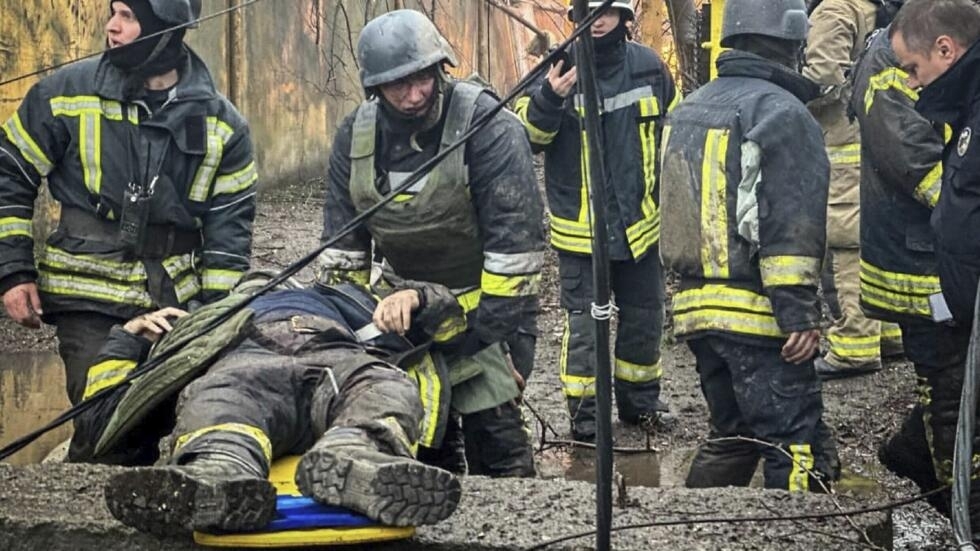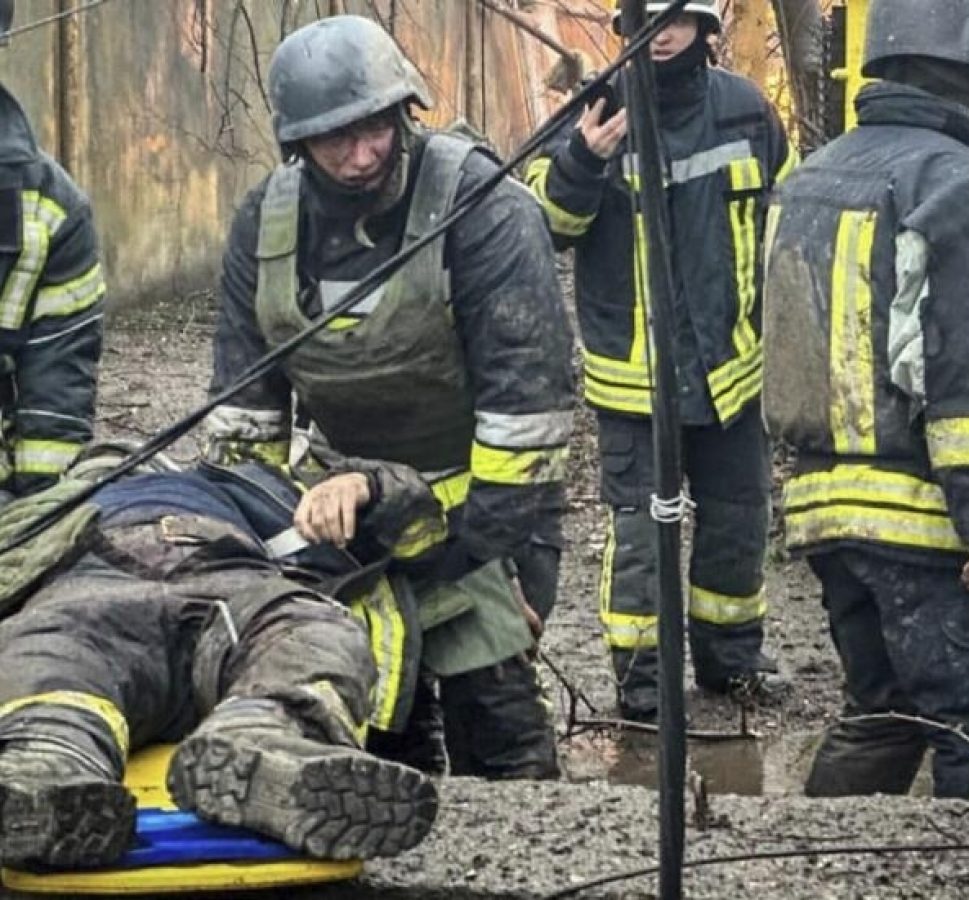
At least 21 people are killed in one of the war’s worst assaults on the port city as Russia continues to make small battlefield gains.
Russian forces’ creeping momentum has continued for a fifth week after the fall of Avdiivka in eastern Ukraine as the Russian command moved reservists from other parts of the front to press its advantage.
The villages of Tonenke and Nevelske, west of Avdiivka, fell to the Russian advance by Saturday.
In the same area, Russia’s Ministry of Defence claimed Orlivka three days later, and Russian forces seemed to be swallowing the village of Berdychi street by street.
“The enemy concentrated its main efforts in the Avdiivka direction and for several days in a row has been trying to break through the defence of our troops, defended by three brigades,” Ukraine’s commander-in-chief, Oleksandr Syrskyii, said on Friday.
“Three brigades are being attacked by an army consisting of several divisions,” said Dmytro Kukharchuk, a Ukrainian battalion commander in the Avdiivka area. “The Russian troops are trying to create a 10-to-1 advantage.”
Dmytro Lykhovyi, spokesperson for the Tavria Group of forces facing Russia there, had claimed the front was “stabilised” in early March.

Ukrainian military observer Konstantyn Mashovets said that assessment was premature but the Russian advance was slowing because “the enemy has already activated most of its tactical reserves and already ‘unpacked’ operational reserves.”
“The enemy failed to achieve breakthroughs tens of kilometres deep,” and advancing “even a couple of kilometres is not cheap”, Mashovets said, suggesting Ukrainian forces retained their power to exact a high toll. Kukharchuk, too, said Russian forces were paying for their tactical success with “colossal losses”.
Ukraine’s military said it killed or wounded 6,600 Russians in the week before President Vladimir Putin’s re-election on Sunday – almost 1,000 a day. Al Jazeera was unable to confirm this toll.
While the Avdiivka region was the main thrust of the Russian assault, Russia also intensified operations elsewhere. Its forces marginally advanced near Verbove, a village in the southern region of Zaporizhia, and near Synkivka, a village in the northeastern region of Kharkiv – demonstrating the complexity of Ukraine’s defensive tasks.
Russia also kept up the pressure on Ukrainian civilians, firing drones and missiles into the country during the 108th week of the war.
The worst attack came on Friday when two Iskander ballistic missiles landed on homes in the Black Sea port city of Odesa, killing 21 people – one of the city’s deadliest attacks of the war.
Ukrainian President Volodymyr Zelenskyy said Russia has fired 130 missiles, 320 Shahed drones and 900 glide bombs in March alone.
Since March 13, Ukraine has shot down 80 out of 101 Iranian-designed Shahed drones launched by Russia, it said.
Russians pay at the pump
As these desperate struggles played out on the ground, Ukraine continued to attack Russia at home, carrying out a stated policy of making Russians feel the pain of their own war by destroying oil infrastructure.
On Friday, Ukrainian military intelligence sources said they had struck the Perviy Zavod oil refinery in Kaluga, 160km (100km) southwest of Moscow, which reportedly supplies the military. Russian outlet Baza confirmed there was a blaze, and a large explosion at the plant was caught on camera.
The following day Zelenskyy said Ukraine struck three oil refineries in the Samara region of Russia, 500km (310 miles) southeast of Moscow. Samara’s governor confirmed there was an explosion at the Novokuibyshevsky refinery. News outlet RBC-Ukraine said the Kuibyshevsky and Syzran Rosneft refineries were also struck and the three refineries were responsible for a 10th of Russian oil-refining capacity, processing 25m tonnes of crude oil a year.

On Sunday, Putin’s re-election day, the Security Service of Ukraine said it had struck the Slavyansk oil refinery, 500km (310 miles) south of Moscow. According to a Russian military news outlet, it was just one of eight attacks on infrastructure across the country that day.
Russia forbade exports of refined petrochemicals in September to bring prices down from a high of nearly 77,000 rubles ($840) a tonne for AI-95 standard petrol. RBC-Russia reported that repeated attacks had helped drive AI-95 to its highest price since, of 60,500 rubles ($661) a tonne on March 13.
Ukraine has struck several Russian petrochemical processing or loading plants since the beginning of the year, from St Petersburg to the Black Sea coast.
Kyiv also allowed anti-Putin Russian paramilitaries to launch a cross-border incursion from its soil the week before Putin’s election. The Russian Volunteer Force, Freedom of Russia Legion (LSR) and Siberian Battalion attacked border garrisons in Belgorod and Kursk on March 12.
On Sunday, the LSR and Siberian Battalion said they had seized an administrative building in Gorkovsky, a border settlement in Belgorod, suggesting the incursion was ongoing.
That prompted Putin to talk of creating a “sanitary zone” on Ukrainian soil to protect Russian borders.
“I do not rule that out. … We will be forced at some point, when we consider it appropriate, to create a certain ‘sanitary zone’ in today’s territories subordinate to the Kyiv regime,” Putin said at a news conference on Monday, calling the paramilitaries “traitors”.

The incursions also went the other way.
Ukraine said it had repelled three reconnaissance and sabotage groups that crossed into its Sumy region from Russia.
Russia has frequently spoken of its openness to a negotiated end to the war, and this has garnered support among Western countries, including among members of the Republican Party in the United States who have pressed Ukraine to open talks.

Putin’s right-hand man and deputy head of the National Security Council, Dmitry Medvedev, outlined last week what that negotiated peace might look like.
In a March 14 post on Telegram, he demanded “unconditional surrender”, the delisting of Ukraine as a sovereign country at the United Nations, its complete demilitarisation and Western recognition of its government as Nazis.
“This may be the soft Russian formula for peace,” Medvedev said. “This is a compromise position, right? I think it is precisely on this basis that we can seek a benevolent consensus with the international community.”
Less than a week later, Zelenskyy said in an evening address that “Putin must lose.”
“Our actions must be long range to defeat Putin rather than being in a situation where doubts about the strength of the West benefit this lunatic,” the Ukrainian leader said.







